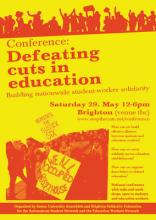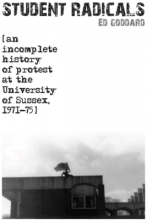Sussex Uni: 300 staff and students demonstrate at lunchtime protest
Staff and students rallied against planned privatisation of over 10% of campus jobs in Library Square this lunchtime. Staff had come equipped to disrupt a planned 'bidders meeting' with many carrying airhorns, only to discover management had moved the meeting to the Amex stadium across the road. With security and conference staff amongst those facing outsourcing, suggests management don't feel able to hold such meetings on campus without the details leaking out and the threat of disruption.







